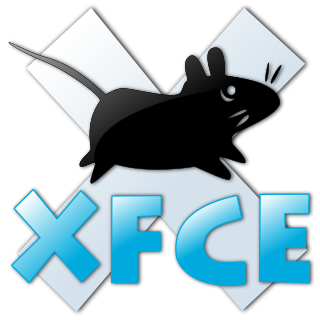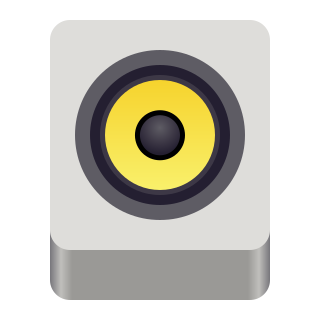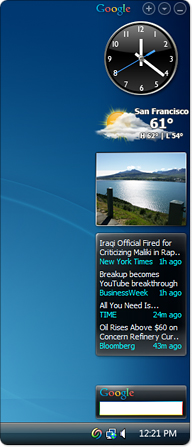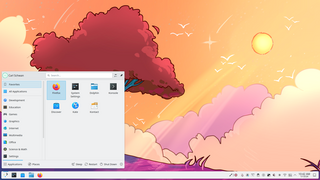
Xfce or XFCE is a free and open-source desktop environment for Linux and other Unix-like operating systems.

Rhythmbox is a free and open-source audio player software, tag editor and music organizer for digital audio files on Linux and Unix-like systems.

Google Desktop was a computer program with desktop search capabilities, created by Google for Linux, Apple Mac OS X, and Microsoft Windows systems. It allowed text searches of a user's email messages, computer files, music, photos, chats, Web pages viewed, and the ability to display "Google Gadgets" on the user's desktop in a Sidebar.

Desktop search tools search within a user's own computer files as opposed to searching the Internet. These tools are designed to find information on the user's PC, including web browser history, e-mail archives, text documents, sound files, images, and video. A variety of desktop search programs are now available; see this list for examples. Most desktop search programs are standalone applications. Desktop search products are software alternatives to the search software included in the operating system, helping users sift through desktop files, emails, attachments, and more.

digiKam is a free and open-source image organizer and tag editor written in C++ using the KDE Frameworks.

KDE Software Compilation 4 was the only series of the so-called KDE Software Compilation, first released in January 2008 and the last release being 4.14.3 released in November 2014. It was the follow-up to K Desktop Environment 3. Following KDE SC 4, the compilation was broken up into basic framework libraries, desktop environment and applications, which are termed KDE Frameworks 5, KDE Plasma 5 and KDE Applications, respectively.

Maemo is a software platform originally developed by Nokia, now developed by the community, for smartphones and Internet tablets. The platform comprises both the Maemo operating system and SDK. Maemo played a key role in Nokia's strategy to compete with Apple and Android, but ultimately failed to surpass both companies.Maemo is mostly based on open-source code and has been developed by Maemo Devices within Nokia in collaboration with many open-source projects such as the Linux kernel, Debian, and GNOME. Maemo is based on Debian and draws much of its GUI, frameworks, and libraries from the GNOME project. It uses the Matchbox window manager and the GTK-based Hildon framework as its GUI and application framework.

NetworkManager is a daemon that sits on top of libudev and other Linux kernel interfaces and provides a high-level interface for the configuration of the network interfaces.

Compiz is a compositing window manager for the X Window System, using 3D graphics hardware to create fast compositing desktop effects for window management. Effects, such as a minimization animation or a cube workspace, are implemented as loadable plugins. Because it conforms to the ICCCM conventions, Compiz can be used as a substitute for the default Mutter or Metacity, when using GNOME Panel, or KWin in KDE Plasma Workspaces. Internally Compiz uses the OpenGL library as the interface to the graphics hardware.

GNOME Commander is a 'two panel' graphical file manager for GNOME. It is built using the GTK+ toolkit and GVfs.

KDE Plasma 4 is the fourth generation of the KDE workspace environments. It consists of three workspaces, each targeting a certain platform: Plasma Desktop for traditional desktop PCs and notebooks, Plasma Netbook for netbooks, and Plasma Active for tablet PCs and similar devices.

PulseAudio is a network-capable sound server program distributed via the freedesktop.org project. It runs mainly on Linux, including Windows Subsystem for Linux on Microsoft Windows and Termux on Android; various BSD distributions such as FreeBSD, OpenBSD, and macOS; as well as Illumos distributions and the Solaris operating system. It serves as a middleware in between applications and hardware and handles raw PCM audio streams.
HAL is a software subsystem for UNIX-like operating systems providing hardware abstraction.
In computer science, the semantic desktop is a collective term for ideas related to changing a computer's user interface and data handling capabilities so that data are more easily shared between different applications or tasks and so that data that once could not be automatically processed by a computer could be. It also encompasses some ideas about being able to share information automatically between different people. This concept is very much related to the Semantic Web, but is distinct insofar as its main concern is the personal use of information.

Tracker is a file indexing and search framework for Linux and other Unix-like systems. It is written in the C programming language.
Avant Window Navigator is a dock-like bar for Linux, which sits on an edge of a user's screen and tracks open windows. Instead of representing open windows as buttons or segments on a bar, it uses large icons on a translucent background to increase readability and add visual appeal. The program was created by Neil J. Patel.
NEPOMUK is an open-source software specification that is concerned with the development of a social semantic desktop that enriches and interconnects data from different desktop applications using semantic metadata stored as RDF. Between 2006 and 2008 it was funded by a European Union research project of the same name that grouped together industrial and academic actors to develop various Semantic Desktop technologies.

MATE is a desktop environment composed of free and open-source software that runs on Linux, and other Unix-like operating systems such as BSD, and illumos operating systems.

KDE Frameworks is a collection of libraries and software frameworks readily available to any Qt-based software stacks or applications on multiple operating systems. Featuring frequently needed functionality solutions like hardware integration, file format support, additional graphical control elements, plotting functions, and spell checking, the collection serves as the technological foundation for KDE Plasma and KDE Gear. It is distributed under the GNU Lesser General Public License (LGPL).

Plasma is a graphical shell developed by KDE for Unix-like operating systems. Plasma is a standard desktop interface. It was declared mature with the release of KDE SC 4.2. It is designed for desktop PCs and larger laptops. In its default configuration, it resembles KDesktop from K Desktop Environment 3 and Microsoft Windows XP; however, extensive configurability allows radical departures from the default layout.















